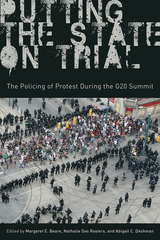
Surveillance is commonly rationalized as a practice to address existing political or social problems such as crime, fraud, and terrorism. This book explores how surveillance systems can, under the guise of managing risk or reducing harm, cause or exacerbate a range of problems, including poverty, over-policing, suspicion, and exclusion.
This volume presents essays written by Canadian scholars who interrogate the moral and ideological bases and the material effects of various surveillance practices and systems. The contributors explore the relationship between surveillance and social and political problems in a number of cultural locations and institutional arenas: policing, consumerism, welfare administration, disaster management, popular culture, moral regulation, news media, social movements, and anti-terrorism campaigns.
These original theoretical and empirical essays examine and challenge us to consider the question: How can we ensure a future in which the consequences of surveillance are not taken for granted as normal, or necessary, features of modern life?
The thought-provoking discussion of problems and potential solutions makes this book a valuable resource for students and practitioners of sociology, criminology, history, anthropology, political science, and communications and culture.
This particular collection is unique in both its strong Canadian content, and the broad range of empirical cases.
In this sprightly volume, the wide tires of surveillance theory and propaganda meet the reality inducing roads of critical conceptual and empirical inquiry. The field of surveillance studies lurches forward as a result. This informative interdisciplinary work by Canadian scholars (the country in the forefront of surveillance studies) should be read by anyone interested in the richness, complexity, and varied consequences of both traditional and new surveillance techniques.
Sean P. Hier is an associate professor in the Department of Sociology at the University of Victoria. Josh Greenberg is an assistant professor in the School of Journalism and Communication at Carleton University.
Contributors: Charlene D. Elliott, Neil Gerlach, Kevin D. Haggerty, Sheryl N. Hamilton, Laura Huey, Simon J. Kiss, Mike Larsen, Shoshana Magnet, Patrick F. Parnaby, Justin Piché, C. Victoria Reed, Joseph Scanlon, Scott Thompson, Kevin Walby, and Dwayne Winseck
Foreword / Kevin D. Haggerty
Introduction / Sean P. Hier and Josh Greenberg
1 The Politics of Surveillance: Power, Paradigms, and the Field of Visibility / Sean P. Hier and Josh Greenberg
Part 1: Stigma, Morality, and Social Control
2 Kid-Visible: Childhood Obesity, Body Surveillance, and the Techniques of Care / Charlene D. Elliott
3 Police Surveillance of Male-with-Male Public Sex in Ontario, 1983-94 / Kevin Walby
4 A Kind of Prohibition: Targets of the Liquor Control Board of Ontario’s Interdiction List, 1953-75 / Scott Thompson
Part 2: Environmental Design, Consumerism, and Privacy
5 Natural Surveillance, Crime Prevention, and the Effects of Being Seen / Patrick F. Parnaby and C. Victoria Reed
6 Administering the Dead: Mass Death and the Problem of Privacy / Joseph Scanlon
7 Identity Theft and the Construction of Creditable Subjects / Sheryl N. Hamilton
Part 3: Genetics, Security, and Biometrics
8 From Bodily Integrity to Genetic Surveillance: The Impacts of DNA Identification in Criminal Justice / Neil Gerlach
9 Communication and the Sorrows of Empire: Surveillance and Information Operations “Blowback” in the Global War on Terrorism / Dwayne Winseck
10 Bio-Benefits: Technologies of Criminalization, Biometrics, and the Welfare System / Shoshana Magnet
Part 4: Participatory Surveillance and Resistance
11 Public Vigilance Campaigns and Participatory Surveillance after 11 September 2001 / Mike Larsen and Justin Piché
12 Cell Phones and Surveillance: Mobile Technology, States, and Social Movements / Simon J. Kiss
13 Subverting Surveillance Systems: Access to Information Mechanisms as Tools of Counter-Surveillance / Laura Huey
References
Index









